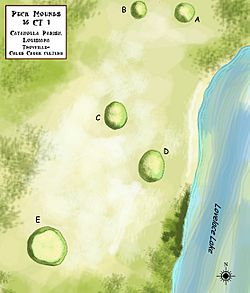Peck Mounds facts for kids

Arrangement of the mounds at the Peck site
|
|
| Location | Sicily Island, Louisiana, Catahoula Parish, Louisiana, |
|---|---|
| Region | Catahoula Parish, Louisiana |
| Coordinates | 31°49′30.98″N 91°39′4.05″W / 31.8252722°N 91.6511250°W |
| History | |
| Founded | 650 CE |
| Abandoned | 860 |
| Cultures | Troyville culture, Coles Creek culture |
| Site notes | |
| Responsible body: private | |
Peck Mounds (also known as 16 CT 1) is an ancient archaeological site in Catahoula Parish, Louisiana, USA. It's a place where people from the past, specifically the Late Troyville and early Coles Creek cultures, lived and built things. These cultures were active between 650 CE and 860 CE. An archaeological site is like a historical puzzle, where experts called archaeologists dig up clues to learn about how people lived long ago.
What are Peck Mounds?
The Peck Mounds site is located near a place called Ferry Place Plantation. It originally had five large dirt mounds, but one of them can't be seen anymore.
The Mounds Today
Of the four mounds still visible:
- Three are low, dome-shaped bumps. They are about 4 feet (1.2 meters) tall. Their bases are roughly 100 feet (30 meters) by 130 feet (40 meters) wide.
- Mound E is the largest and is located furthest south. It's a special type of mound called a platform mound. This means it has a flat top, like a raised stage. Mound E is about 18 feet (5.5 meters) tall. Its base is around 165 feet (50 meters) by 180 feet (55 meters), and its flat top measures about 65 feet (20 meters) by 55 feet (17 meters).
Where are the Mounds Located?
The site sits on a raised area called Maçon Ridge and looks out over Lake Lovelace. It's a beautiful spot!
History of the Site
Peck Mounds was added to the National Register of Historic Places (NRHP) on August 29, 1980. The NRHP is an official list of places in the USA that are important to history. This site is part of a larger area called the Ferry Place National Register District.
The Peck Mounds site was first written about by an archaeologist named James A. Ford in 1933. He was doing research at a nearby place called the Peck Village Site, which is also next to Lake Lovelace, about 0.75 miles (1.2 kilometers) south of the mounds.
 | John T. Biggers |
 | Thomas Blackshear |
 | Mark Bradford |
 | Beverly Buchanan |


